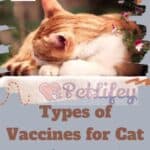
If you have a rabbit at home, it is essential that you worry about knowing what vaccines are necessary in rabbits, since, like any other pet, our little furry is susceptible to contracting diseases that can seriously affect its health.
In this post we tell you what vaccines you should give your rabbit and when to do it .
What are the necessary vaccines in rabbits?
The two most important vaccines for our rabbit are myxomatosis and homorrhagic disease. Both are diseases with a mortality rate close to 100% and very contagious, which can affect even a domestic rabbit that lives with humans and without other congeners, although it is true that the danger multiplies when several specimens share space.
Both diseases have been developed by humans to kill wild rabbits. Mortality is practically 100% for domestic rabbits and there is no treatment that can cure them .
These two vaccines are:
- Myxomatosis vaccine
- Viral hemorrhagic disease vaccine
Myxomatosis:
It is a serious rabbit disease caused by a virus (Poxvirus). It decimated the rabbit population in the Spanish mountains in the 70s and was a determining factor in the compromised situation in which the survival of the Iberian lynx is seen. To this day, the epidemic among wild rabbits has not yet been controlled, but thanks to the vaccine, displeasure with pets can be avoided.
Myxomatosis is transmitted, not only by direct contact, but also by mosquitoes or fleas.
What happens if my rabbit becomes infected with myxomatosis and is not vaccinated?
- Classic symptoms: they begin with red eyes and genital inflammation. It quickly evolves into severe conjunctivitis that causes blindness and lumps appear on the head and body, as well as pus discharge from the eyes and nose. Unfortunately, they die after 10-15 days.
- Atypical symptoms: respiratory problems such as pneumonia.
It is important to vaccinate your rabbit for myxomatosis to avoid a slow and painful death if they become infected. There is no 100% totally effective vaccine, and even less against a virus like this, but in the event of contagion, the symptoms may be milder and better treated. The kitten’s immune status also plays an important role in the severity of these symptoms, although it is difficult to predict how a vaccinated bunny will respond to infection. With this in mind, it is always recommended to vaccinate rabbits against myxomatosis. Remember that an unvaccinated bunny that contracts myxomatosis is very, very likely to die.
When should I vaccinate my rabbit for myxomatosis?
From 2 months of age, only in healthy bunnies!
It depends on the type of vaccine used, it will be revaccinated every 6 or 12 months. For rabbits that are in field areas or that go outside in areas where there are wild rabbits relatively close, it is recommended to put it every 3 months. We must consult with the vet to discuss the different options.
Using anti-mosquito measures and safe anti-flea products for rabbits is also important.
Can the myxomatosis vaccine have side effects?
Specifically (in less than 10% cases) we can observe a small non-painful nodule at the injection site, which disappears after 3 weeks. Rarely, transient fever. It is therefore a vaccine with few side effects.
Viral hemorrhage:
After one to three days of the incubation period, it appears suddenly and causes death within hours (between 12 and 36 hours). The rabbit hemorrhagic disease virus produces necropsies in the internal tissues of the animal, which, given the rapid evolution of the disease, sometimes does not have time to detect.
It is a devastating disease that can kill the rabbit without giving previous symptoms. Many sudden and unexplained rabbit deaths can be due to this disease as death is so rapid that most of the time only a necropsy can identify it as the cause of death.
What happens if my rabbit becomes infected with Viral Hemorrhage and is not vaccinated?
Sometimes, the viral hemorrhage in rabbits is really fulminant and comes to kill the animal if it has presented symptoms. This sudden death can occur in just a few days.
The disease takes about 48 hours to incubate and, if symptoms occur, they are generally the following:
- Fever
- Decay
- Breathing difficulties
- Seizures
- Nasal bleeding
- Dizziness, lack of coordination, difficulty moving
Why is it important to vaccinate your rabbit against viral hemorrhage?
There is NO treatment for viral bleeding. As we say, in fact, they often die before presenting any symptoms, but even presenting them, the vast majority of sick rabbits die without remedy. Having the vaccine for this type of disease is your only hope for survival.
When should I vaccinate my rabbit for viral hemorrhage?
Rabbits cannot be vaccinated until they have reached two months of age, and it is recommended to space both vaccines, myxomatosis and hemorrhagic fever, in an approximate time of two weeks, instead of providing them together. By analogy with other mammals, the application of several vaccines at the same time, very small breed rabbits, such as dwarf rabbits, leaves open the possibility that the animal may develop any of the diseases against which they are intended. immunize.
The ideal time to vaccinate rabbits against hemorrhagic disease and against myxomatosis is spring, since summer is when there is an increase in cases of these diseases, although it can be done throughout the year.
The exotic species veterinarian is the one who can best advise us depending on the country where each one resides and the breed of the rabbit, since some are more susceptible to contagion than others.
Other vaccines needed for rabbits
When many rabbits coexist sharing space, the advisability of vaccinating them in autumn against bacterial respiratory diseases will be studied. These pathologies, if they occur, are treatable with antibiotics.
There are different diseases that can affect our rabbit for this reason it is important to know in depth if we have several specimens living together.
Are you already clear about the vaccines that you should give your rabbit?
As you have seen, it is vitally important to your health! Go to your vet to check on your little friend and assess the vaccination protocol to follow.






